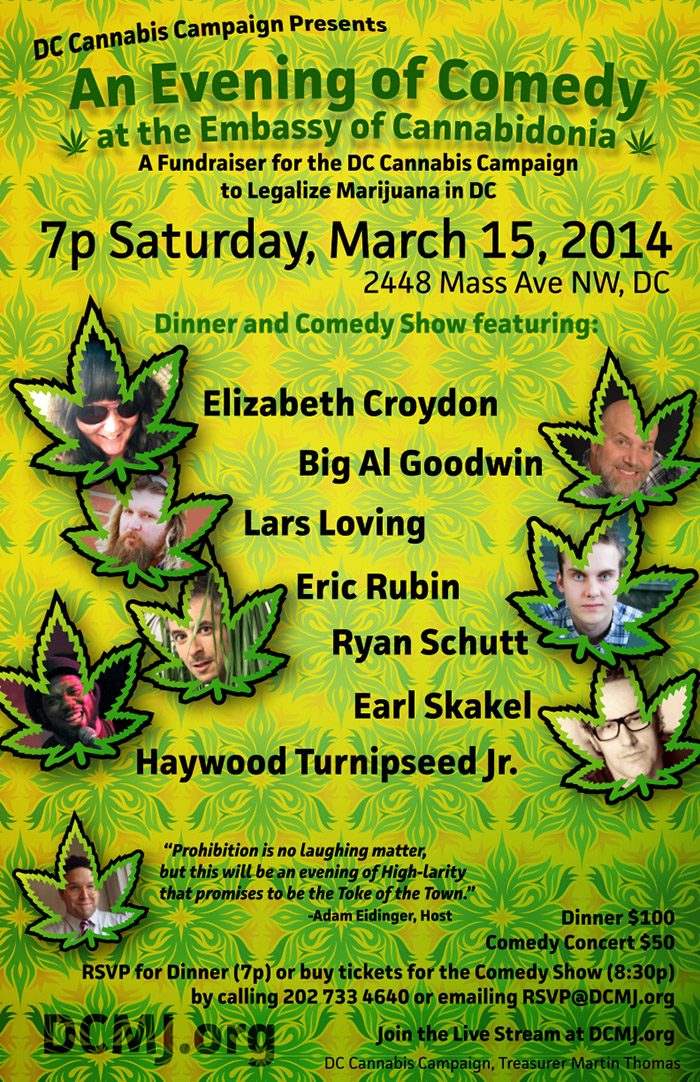“Do not make references to anything illegal or you will be asked to leave.”
For four years, that sign hung at Capitol Hemp, formerly the city’s largest vendor of hemp products and artisan glassware. The Adams Morgan headshop stocked everything a stoner would need—pipes, rolling papers, vaporizer equipment—but, of course, these products could only legally be used for consuming tobacco. Selling tobacco accessories becomes peddling drug paraphernalia when “direct or circumstantial evidence” suggests that the clerk would “reasonably know” the merchandise will be used to consume a controlled substance.
Yet, given these parameters, the store was in compliance with District law and generated over $1 million in annual sales. The underground shop served as the unofficial headquarters of the District’s pro-cannabis activists. D.C. flags emblazoned with the pro-statehood slogan “No taxation without representation” joined paintings of hemp leaves lining the walls. A history of D.C.’s medical marijuana program was printed on the counter. Along with smoking instruments, Capitol Hemp also sold books on medical cannabis and marijuana legalization.
All the while, the owners of the store leveraged their success as small-business owners to advocate for reform of hemp laws. In 2010, Capitol Hemp donated $25,000 to help pass California Proposition 19, a voter initiative that sought to legalize all forms of cannabis, including industrial hemp farming. While hemp is genetically related to marijuana, it is not psychoactive. In the United States, selling hemp products is legal, but growing the plant is not.
Even so, on Oct. 26, 2011, D.C. police raided Capitol Hemp, arresting six people. The officers executed a search warrant for selling drug paraphernalia and suspected drug possession. Tests taken at the scene for THC, the psychoactive chemical found in marijuana, were positive.
In exchange for dropping the charges and returning $350,000 in seized glassware, the owners, Adam Eidinger and Alan Amsterdam, agreed to shut down the store, forcing them to lay off their ten employees.
Two days after police raided Capitol Hemp, officers stormed two other Adams Morgan headshops, again seizing property and alleging the sale of paraphernalia. A few months earlier, Mayor Vincent Gray (D) had publicly come out against selling drug paraphernalia.
Eidinger and Amsterdam were anomalies among headshop owners, who usually refrain from any smack of issue advocacy. Until police raided his store, Eidinger had no reason to believe he was breaking any laws. “Historically, headshop owners have been afraid to be political in any way,” Eidinger said. “We worked it out with lawyers ahead of time to make sure our store wasn’t getting us into trouble. They still used it against us.”
A veteran anti-war and anti-GMO activist, Eidinger decided that the closure of his store meant that it was time for him to head a campaign to legalize recreational marijuana in the District of Columbia. “They still said that if you sell hemp, it’s like code that you’re pro-marijuana. Well, yeah, it is. It is. But they were right. We were a store that believed in the legalization of marijuana, and now we all think that’s what I am. They think that’s what I am, so I might as well do it,” he said. “If they had not raided my store, I wouldn’t have taken a leadership role in the campaign.”
Last month, DCMJ, the campaign Eidinger founded, released a draft of a referendum that would legalize recreational use of marijuana for adults over 21. Possession of up to two ounces would be permitted, as would growing up to six cannabis plants for personal use.
A poll conducted by Public Policy Polling released last April found that 63 percent of D.C. residents would support legalizing marijuana and regulating its sale for adults. Moreover, 75 percent of D.C. residents would approve of decriminalization.
Even though support for legalization has ballooned in recent years, anti-drug taboo remains strong. This obstacle, in addition to the tall legal hurdles the measure faces, poses a challenge for advocates of legalization. Offered as a way to help remedy the racial discrepancies in enforcement of drug laws, the proposed law is so far struggling to gain traction among young, predominantly white residents of the city, whom the drug war seldom reaches.
Despite the obstacles and potential pitfalls, marijuana activists remain confident that they can change the law. With other states eyeing legalization in 2014, D.C. could both provide a symbolic victory to pro-marijuana activists and serve as a model for how the rest of the country should proceed. “It’s a serious change, and it’s such a serious change that it could actually be a flipping point switch for the whole country,” Eidinger said.
***
Drug laws have been the subject of differential enforcement for decades. A June 2013 report by the American Civil Liberties Union found that, nationwide, a black person was 3.73 times more likely than a white person to be arrested for marijuana possession between 2001 and 2010, despite similar rates of usage between the two groups.
In fact, the gap in arrest rates between whites and blacks in the District of Columbia is much greater than the national average. While the arrest rate for possession was about 0.185 percent for white Washingtonians, the arrest rate for black Washingtonians was found to be 1.49 percent.
While many observers would blame the inconsistency in enforcement on racial profiling, there are likely several factors at work.
“There are many reasons for the disparity. It may include some amount of racial profiling by police but it may include other stuff, and probably does,” said Art Spitzer, legal director of the ACLU office in Washington, D.C. “There’s lots more police riding around and walking around in Anacostia than there are in the Georgetown University campus.”
Kristopher Baumann, chairman of the D.C. Police Union, explained the discrepancy by saying that all crime is centered in communities predominantly consisting of minorities. “We’ve had large concentrations of criminal activity that’s been going on for two decades, and that’s where unfortunately, the crimes are located,” he said.
Bill Piper, director of national affairs for the Drug Policy Alliance agreed that police presence factors into the disparity but says there are other factors at work.
“I would say, unquestionably, the reason racial disparities are so stark is that the police are focused in communities of color,” Piper said. “That begs the question, ‘Why are the police not just patrolling certain areas but searching people?’ I’m pretty sure if the D.C. Police Department went into Georgetown and searched people randomly, they’d find a lot of pot. But those searches would probably stop pretty quickly because they’d get a lot of phone calls from affluent people. So, instead, they patrol the areas of people who have less political clout.”
Nonetheless, concerns about racial disparities in arrest rates prompted D.C. Councilmember Tommy Wells (D-Ward 7) to introduce legislation to the Council decriminalizing possession. Under his proposal, people who are caught with weed would be slapped with a civil fine of $25 instead of facing jail time.
“It’s an issue of social justice,” Wells said in an interview with the Voice last week. “Once you have a criminal charge, you can’t even work on a construction site or get a commercial driver’s license. You may even get kicked out of your housing. The charge dissociates you from society and limits economic opportunities. The ACLU reported that right now, there’s a disproportionate impact on African Americans, and it’s unfair.”
Groups ranging from the ACLU, NAACP, and the Drug Policy Alliance have all expressed support for Wells’s legislation.
“Wells’s bill is a really good start because it ends the mass-arrests of young people of color,” Piper said. “I think once we get rid of mass incarceration, we can have a city-wide conversation about treating marijuana more like alcohol.”
Conversely, while Eidinger thinks that decriminalization would be a positive step, he thinks it wouldn’t go far enough to address the racial disparities associated with marijuana prohibition.
“If you’re going to fine marijuana users $100 or $25 or you’re going to search them and harass and stop them while they’re just trying to go about their business, police are used to doing that,” he said. “I don’t think that much has changed. I mean, the only thing that’s changed is that they’ll put the cuffs on you and they won’t take you to the jail.”
Eidinger also thinks that the Council is only taking up decriminalization now to draw away support for his legalization initiative.
“I think there are nine city councilmembers that are pretty much pro-legalization, but they don’t say it out loud,” he said. “In fact, they’ll only support decriminalization…They want to get decriminalization through the Council and that’s probably going to pass at the end of January.”
Wells’s bill is expected to pass the Council before the end of January. With nine co-sponsors and the support of the Mayor, the measure is assured success.
A few weeks ago, Eidinger said that he would withdraw his proposal if Wells’s decriminalization bill drew support away from legalization. Now, he says, he’ll go forward with his proposal “no matter what.”
***
DCMJ’s draft proposal only legalizes up to two ounces of marijuana, double the amount that was legalized in Colorado last year. The referendum proposal hasn’t been formally submitted to the D.C. Board of Elections yet because Eidinger is waiting to incorporate comments from the public into the draft proposal.
District law prohibits referendum measures from authorizing new taxation or spending. If the initiative is passed next November, it will only legalize cannabis, not regulate its cultivation or sale. In effect, Eidinger is betting that the measure will force D.C.’s hand to set up such a regulatory scheme, even if it is unwilling to do so right now.
In fact, the Council could vote to modify or even repeal the law if it passes. In addition, since Congress retains the power to overturn D.C. laws with impunity, the federal legislature could also interfere with the law taking effect.
But, first, the referendum needs to make it on the ballot. To do that, DCMJ needs to collect the signatures of at least five percent of the voters in the District, which amounts to about 20,000 names.
To do that, DCMJ needs to organize a campaign and raise money. “DCMJ is going to have to raise $350,000 to run a competitive campaign here, to run a professional campaign,” Eidinger said.
***
Activism on the issue is further complicated by the continued criminality and the history of cannabis use in minority communities.
“We really are handicapped by the heavy police presence in the city, the long history of abuse on the issue. …The African American community, which has been doing a lot of organizing, has hesitated to do anything public. People are very nervous,” Eidinger said. “I think a lot of cannabis users are afraid to speak out. …You’re trying to change something that’s a criminal activity right now.”
So far, Eidinger says that the pro-legalization activism has noticeably been missing another cohort: young people.
“I feel that most of the activism is coming from people who are in their 40s and 50s and they’re people who have been working on this issue for a long time,” he said. “Where are the really young people, who are probably the most affected? I don’t know, maybe it’s not the college kids who are getting busted, and it’s just poor black kids in Southeast who are getting busted. I don’t know.”
Eidinger points to a common theme in drug policy activism. Whites are much less affected, so they tend to prioritize the issue less. Piper said he noticed the same general trend. “I’ve always found, generally, that there’s a disconnect on this issue in that it is sometimes hard to get younger, white people really motivated, because to some extent, marijuana is already legal for them. Because they’re less likely to be searched, and caught, and arrested, and, if they are arrested, they’re less likely to do jail time,” he said.
No college campus in the District has organized affiliated campaign committees to legalize marijuana in 2014, even though Eidinger’s proposal has been widely circulated. “Someone needs to step up. I mean, where are the leaders?” Eidinger asked. “I want to see the millennial leaders step it up, and I’m calling it out.”
Out of several progressive campus groups, only a representative from Georgetown Solidarity Committee said they may support the proposal in due time. “This [issue] presumably falls under that umbrella, mostly because of the catastrophic impact drug laws have had on urban communities and low-income individuals,” Alexandros Taliadoros (SFS ‘14), an active member of GSC wrote in an email to the Voice. “While it’s possible that Solidarity might support the ballot initiative, we have not discussed it as a group.”
***
Closer to home, it remains to be seen whether the University will lessen the punishment for students caught in possession of marijuana once it is either decriminalized or legalized. The student code of conduct was changed earlier this year to get rid of the tiered system against which the severity of violations was judged. Now, each violation is taken on a case-by-case basis, though marijuana infractions historically carried a heavier penalty than being caught drinking alcohol underage.
“Federal law prohibits possession, manufacturing, use of marijuana. We continue to comply with federal laws,” Rachel Pugh, director of media relations, wrote in an email to the Voice.
Additionally, there are no formal changes in the works for the student code of conduct. “The Office of Student Conduct is not planning at this time to make any changes to its policies regarding the decriminalization of marijuana,” Whitney Maddox, judicial coordinator at the Office of Student Conduct wrote in an email to the Voice. “Any changes that occur in the policies or the Code of Student Conduct must be discussed and vetted through the Disciplinary Review Committee.”
Georgetown University Police Chief Jay Gruber did not respond to a request for comment regarding how GUPD would change its policies if marijuana is legalized.
***
For DCMJ, much work remains to be done. Over 5,000 have signed up to help the organization collect signatures, but Eidinger knows only a portion of them will show up.
Still, activists sense a shift in the national conversation on drug policy over the past few years. Asked if he had any reservations for legalization in D.C., Bill Piper wasn’t too worried. “I’m not that concerned because I think the tide is turning very quickly,” he said. “I think 5 years ago, if D.C. legalized or even decriminalized marijuana, it would have been major news. Now, it’s more of the same.”
Given the altered climate, activists no longer have to rely on protests or civil disobedience to get their message across. Now, it’s more about the ground game, like it is for mainstream movements. “Our tactics have changed,” Eidinger said. “We don’t have to get arrested on this issue, we do have to get it on the ballot.”
Source: Georgetown Voice



